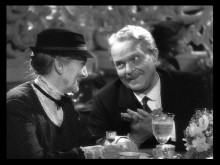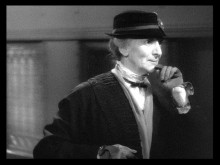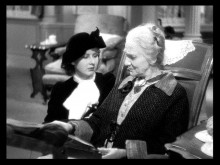When the Academy of Motion Picture Arts and Sciences gave Leo McCarey an Oscar for directing The Awful Truth (1937), he thanked them but added that they’d given him the award for the wrong movie. He was right, because that same year he’d made his masterpiece, Make Way for Tomorrow, a movie that was hated by its studio (Paramount) and which audiences stayed away from. Why? Because it was—and is—a truthful and painful examination of old age and the effects of poverty. It’s been called the “saddest movie ever made,” and not without reason, but it’s also one of the truly great and too often overlooked movies.
Leo McCarey is not as well known today as many of the filmmakers from the “golden age.” I’m not sure why, though two possibilities come to mind. First of all, his work has tended to be overshadowed by the people in his films. He helped create the team of Laurel and Hardy and directed or supervised (in McCarey-speak that translates as directed) many of their best silents. Today, we remember Stan and Ollie more than their directors. When he went to feature films, his stars included Eddie Cantor, the Marx Brothers, W.C. Fields and Mae West. Once again, the stars overtake the director, though it’s fair to note that The Kid From Spain (1932), Duck Soup (1933) and Belle of the Nineties (1934) all represent the most stylish films of Cantor, the Marxes and Mae West respectively. (In the case of the Marxes, Duck Soup is also their best picture.) Beyond this, there’s McCarey’s quick descent into making pretty bad movies post-1945—something that’s exacerbated by him falling in with HUAC and becoming a pretty whacked-out red baiter in his last years. (Try sitting through My Son John (1952) or Satan Never Sleeps (1962).)

All that to one side, McCarey would be an important filmmaker in his own right had he made nothing other than Make Way for Tomorrow, which coincidentally, is the one film of his where the star power can’t overshadow the director. While movie fans might know who Victor Moore and Beulah Bondi are, no one thinks of them as stars—and no movie, including this one, was ever sold on the strength of their names. Oh, they’re splendid in the film—especially Bondi—but this is a case where the director’s name is clearly the selling point. And it wasn’t enough of one in 1937 to do that—especially not with the downbeat material it dealt with. Paramount hated the film and tried to get McCarey to change the ending (God alone knows what happy-ending nonsense they wanted in its stead), but he refused—and the film went out his way. And died at the box office.

I remember seeing the film on the late show when I was a kid in high school. I had no idea what it was, but hey, it was McCarey (at that time, I thought Duck Soup was the finest film ever made) and from Paramount in 1937—that was enough for me. An hour and a half later, I felt like I’d tangled with the business end of a steamroller. I’d never been so completely devastated by a movie—and as a teenager, I know I couldn’t even begin to grasp the enormity of the topic. The idea of a long-married couple being split-up and forced to live apart due to losing their home, having no money and children who won’t take in both of them is too far removed from you then. That, however, is the gist of the film—and McCarey drives it home with a forcefulness that cannot be understood until you’ve seen it.

The genius of Make Way for Tomorrow lies in the fact that the couple—Barkley (Moore) and Lucy Cooper (Bondi)—are not entirely likable, nor are they completely blameless as concerns the mess they’ve landed in. They’re difficult, sometimes overbearing and seem to make no effort to understand the world of their children. In other words, they’re human. (There’s a very good reason why filmmaker Jean Renoir claimed that McCarey was the only director who really understood people.) You end up liking them in bits and pieces, in isolated moments when something more shows through. By the last section of the film—where Bark finally lets on to his one likable son (Thomas Mitchell) that he knows the score and that he and Lucy are going to spend what may well be their last day together without the family—you care deeply for the old couple. When strangers—a car salesman, a hotel manager, a band leader—show them more kindness than their children can muster, it’s at once heart-rending, but understandable.
All of this leads to an ending that is not just the most moving thing McCarey ever fashioned (and the last seven shots of his admittedly treacly Going My Way (1944) are not to be sneezed at in that realm), but may just be the moving thing anyone ever committed to film. As Orson Welles said, “It could make a stone cry.”




Never heard of this movie until I watched it today. Loved the direction of Leo McCarey and the marvelous performances of Beulah Bondi and Victor Moore.
As someone who had the honor of taking care of aged parents and witnessing the heartbreak that dependence on their children brings to the parents,, I think this a film for all time.